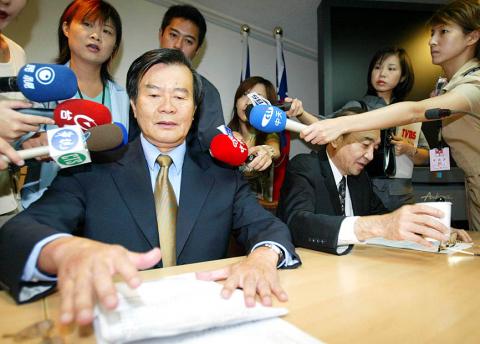Newly appointed representative to Singapore Antonio Chiang (江春男) yesterday had his indictment over drunk driving “suspended” for a year, possibly paving the way for him to assume his new post.
However, he was fined NT$60,000.
Chiang, a former editor-in-chief of the Taipei Times, was scheduled to go to Singapore on Saturday last week, but had to cancel his reservation to await a decision by the Taipei District Prosecutors’ Office on his case. His case was referred to prosecutors a day after he was sworn in as envoy to the Southeast Asian city-state.

Photo: CNA
The suspended prosecution means that the former National Security Council deputy secretary-general will not be indicted if he is not found guilty of breaking the law in the next 12 months.
Chiang demonstrated remorse by admitting to his offense after the fact, which did not cause any injuries, the prosecutors’ office said.
The prosecutors’ office also said that it took the office six working days to process Chiang’s case, which means there is little difference in the way the office has handled his case and other cases of drunk driving.
The Presidential Office, which has come under pressure from a civic group against drunk driving and some lawmakers to replace Chiang, did not comment on the prosecutors’ decision.
Ministry of Foreign Affairs spokeswoman Eleanor Wang (王珮玲) said that while the prosecutors’ office has made a preliminary decision on the drunk-driving case implicating Chiang, there are still other legal procedures awaiting the former journalist.
“Chiang will not report for duty before all relevant legal processes are completed,” Wang said, adding that the ministry does not have a timetable for Chiang’s assumption of his post.
Chiang, 72, has apologized for the incident and said he has engaged in self-reflection since his detention.
He was stopped by Taipei police on Binjiang Street in the early hours of the morning on Wednesday last week and given a Breathalyzer test, which showed a blood alcohol content of 0.27 milligrams per liter (mg/L), about double the legal limit of 0.15 mg/L.
Chiang was detained and referred to the prosecutors’ office for possible indictment on charges of causing a hazard to public safety.
Additional reporting by Stacy Hsu

A Ministry of Foreign Affairs official yesterday said that a delegation that visited China for an APEC meeting did not receive any kind of treatment that downgraded Taiwan’s sovereignty. Department of International Organizations Director-General Jonathan Sun (孫儉元) said that he and a group of ministry officials visited Shenzhen, China, to attend the APEC Informal Senior Officials’ Meeting last month. The trip went “smoothly and safely” for all Taiwanese delegates, as the Chinese side arranged the trip in accordance with long-standing practices, Sun said at the ministry’s weekly briefing. The Taiwanese group did not encounter any political suppression, he said. Sun made the remarks when

PREPAREDNESS: Given the difficulty of importing ammunition during wartime, the Ministry of National Defense said it would prioritize ‘coproduction’ partnerships A newly formed unit of the Marine Corps tasked with land-based security operations has recently replaced its aging, domestically produced rifles with more advanced, US-made M4A1 rifles, a source said yesterday. The unnamed source familiar with the matter said the First Security Battalion of the Marine Corps’ Air Defense and Base Guard Group has replaced its older T65K2 rifles, which have been in service since the late 1980s, with the newly received M4A1s. The source did not say exactly when the upgrade took place or how many M4A1s were issued to the battalion. The confirmation came after Chinese-language media reported

The Taiwanese passport ranked 33rd in a global listing of passports by convenience this month, rising three places from last month’s ranking, but matching its position in January last year. The Henley Passport Index, an international ranking of passports by the number of designations its holder can travel to without a visa, showed that the Taiwan passport enables holders to travel to 139 countries and territories without a visa. Singapore’s passport was ranked the most powerful with visa-free access to 192 destinations out of 227, according to the index published on Tuesday by UK-based migration investment consultancy firm Henley and Partners. Japan’s and

BROAD AGREEMENT: The two are nearing a trade deal to reduce Taiwan’s tariff to 15% and a commitment for TSMC to build five more fabs, a ‘New York Times’ report said Taiwan and the US have reached a broad consensus on a trade deal, the Executive Yuan’s Office of Trade Negotiations said yesterday, after a report said that Washington is set to reduce Taiwan’s tariff rate to 15 percent. The New York Times on Monday reported that the two nations are nearing a trade deal to reduce Taiwan’s tariff rate to 15 percent and commit Taiwan Semiconductor Manufacturing Co (TSMC, 台積電) to building at least five more facilities in the US. “The agreement, which has been under negotiation for months, is being legally scrubbed and could be announced this month,” the paper said,